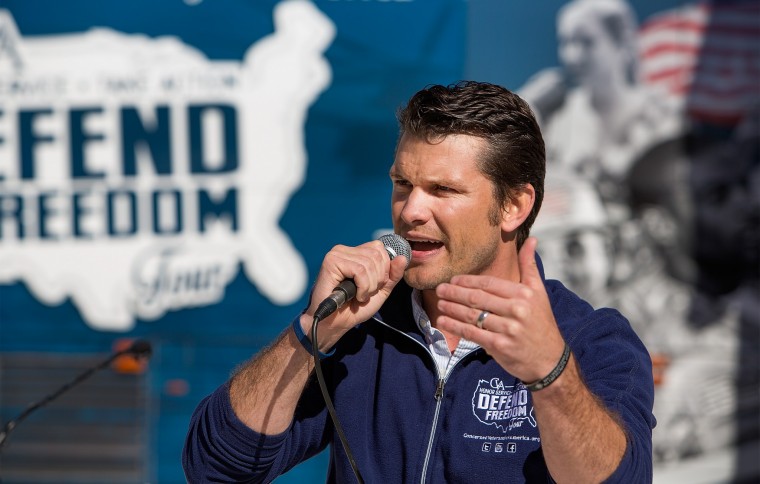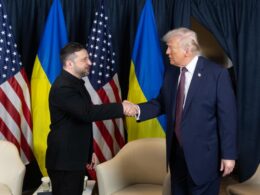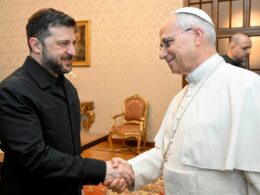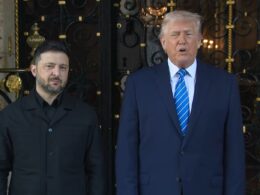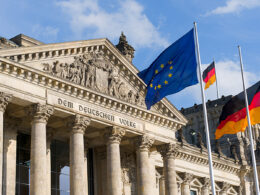United States Defense Secretary Pete Hegseth responded to criticism of Trump's approach as making concessions to Vladimir Putin, rejecting them as ''ahistorical and false.''
After the NATO meeting on 13 February 2025, Hegseth said that ''the arguments that have been made that somehow coming to the table right now is making concessions to Vladimir Putin outright, that the president of the United States shouldn’t otherwise make … I just reject that at its face.''
Hegseth says that Putin is ready for talks as he responds to strength and sees a strong rival in Trump. “Any suggestion that President Trump is doing anything other than negotiating from a position of strength is, on its face, ahistorical and false,” he says.
The US Defense Secretary was also asked why any peacekeeping force should not be covered by Article 5 of NATO (“an armed attack against one or more of them in Europe or North America shall be considered an attack against them all”). He says all details will be discussed only during negotiations and he wouldn’t want to pre-empt that, before going back to his previous point.
''I think realism is an important part of the conversation that hasn’t existed enough … but simply pointing out realism, like the borders won’t be rolled back to what everybody would like them to be in 2014, is not a concession to Vladimir Putin,'' Hegseth said.
Hegseth continued, noting that ''It’s a recognition of the hard power realities on the ground, after a lot of investment in sacrifice, first by the Ukrainians and then by allies, and then a realization that a negotiated peace is going to be some sort of demarcation that neither side wants.''
Trump's defense secretary said that ''It’s just a cheap political point to say, Oh, we’ve left all the negotiating cards off the table in by recognizing some realities that exist on the ground. According to Hegseth, ''President Zelenskyy understands the realities on the ground, president Putin understands the realities on the ground, and president Trump as a deal maker, as a negotiator, understands those dynamics as well.''
He suggests that a promise of an US involvement in natural resources in Ukraine would also form an indirect safety guarantee. He says that an investment relationship would “in the long term … be a lot more tangible” and another way of showing solidarity.That’s one of any number of other opportunities that this president will leverage in these high stakes negotiations.
''So I just reject, on its face, the premise that somehow President Trump isn’t dealing with a full set of cards when he’s the one that can determine, ultimately, what cards he holds,'' Hegseth pointed out.
Asked if he could guarantee that no deal is forced on Ukraine, he says that is “not, ultimately, my decision,” as the talks will be led by Trump. But he points out that the president spoke with both Putin and Zelenskyy, and “any negotiation … will be had with both.”
Regarding Europe, Hegseth said that the US “stand beside you,” but Europeans ''need to step up.'' He repeats his calls for European allies to invest more as he brings up emerging risks and threats in other parts of the world, including areas where he says the US is probably the main partner capable of providing real deterrence, like in the Pacific.
Related:
- NATO chief Rutte: New treaty between Ukraine and Russia must prevent future Russian aggression
- Top EU official: Any agreement concluded without Ukraine and EU is doomed to fail
- Trump claims Ukraine “essentially agreed” to give US access to its rare earth minerals
- NATO chief: Alliance did not promise Ukraine membership as result of any peace talks
- Zelenskyy: I’m ready to negotiate with Putin as long as US and Europe will not abandon Ukraine
- Trump refuses to call Ukraine an equal participant in peace talks

